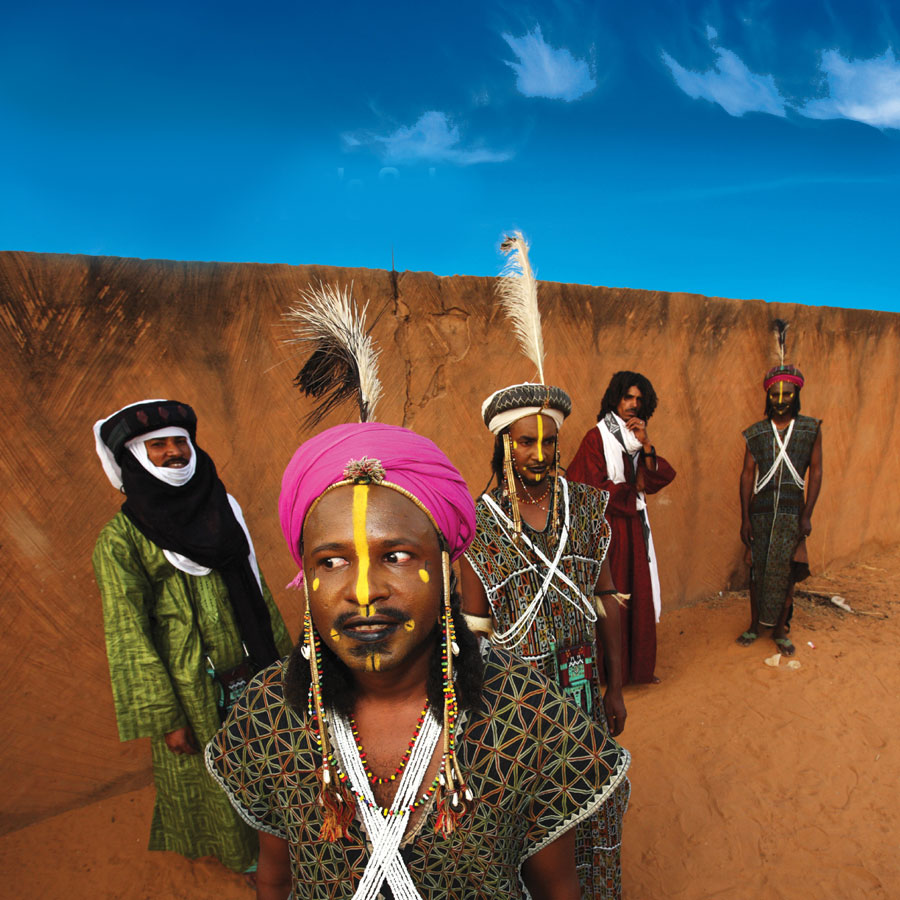 African Sunrise African Sunrise
A nomadic blues
for modern times: Niger’s Etran Finatawa bridge the very old musical and
linguistic traditions of the Arabs of North Africa and those of the
sub-Saharan regions. As the only band in the world to combine the cultures
of Niger’s Wodaabe and Tuareg people, their sound and style reflect the
especially fertile artistic way of life in this part of Africa.
Among
11 tribes in the area, the customarily nomadic Tuareg and Wodaabe have
lived side-by-side for centuries, and the significance of their
collaboration as a band is profound. While they’ve rarely come into conflict
over anything more serious than water supplies, they speak different
languages and have entirely diverse cultural traditions.
“They
share a lot of things, like the same environment, and they also share the
same problems, especially nowadays when you have a lot of drought, and
famine and poverty,” says the group’s manager/spokesperson Sandra van Edig,
a former cultural anthropologist who helped form the band in 2004.
She
regards the alliance between the two groups in Etran Finatawa (which means
The Stars of Tradition) as a symbol showing that, by working work together,
the nomadic people can gain a bit of power, and a chance to help preserve
some very distinct cultural practices.
The
five-member band has recently released a new album, Tarkat Tajje/Let's
Go (Riverboat), a gently percolating
trip typified by nimbly complex tribal percussion and electric guitar
interlacing deceptively lilting vocal polyrhythms. The album features songs
performed in both the Toureg’s Tamajeq language (part of a large linguistic
group shared by the Berber people of North Africa, such as the Moroccans
and Algerians) and the Wodaabes’ Fulfulde tongue, which can be found all
over West and Central Africa. While they’ll often mix the two languages in
their songs, more often they’ll keep them separate –– for a reason.
“We
try to use characteristics from every culture,” says Van Edig, “but we
don’t try to meld them together and find something ‘new,’ because each
culture represented is so rich.”
The
same is true for the group’s onstage gear, where the Wodaabe musicians are
garbed in their traditional embroidered tunics and stunningly painted
faces, and the Tuareg sport their own trademarked indigo turbans.
Not
a musical melting pot as such, Etran presents a series of juxtapositions between
the polyphonic vocal customs of the Wodaabe and the propulsively spidery
guitar of the Tuareg, which bears a familiarity with the angular/lyrical
guitar melodies of their superstar Tuareg brethren, Mali’s Tinariwen. The
percussive polyrhythms are a hybrid of rhythms traditional to North African
nomadic tribes, rapped out on calabasse
gourd drums, ayakure metal
percussion (sometimes worn on the legs), and the giant, goat-skinned bass
drum known as the tende.
The
band has toured to great acclaim all over Europe and America, and has now
turned its attention to Niger, bringing a series of workshops and
performances to schools and community centers across the country, where the
kids are fast forgetting their people’s customs and traditions –– if they ever
learned about it at all.
Etran
Finatawa is, says Van Edig, more than just about making music.
“It’s
a mission, and even an obligation, for the youth of Niger, and for
humanity.” 
|